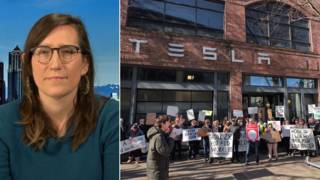HeadlinesMay 17, 2019
Trump Immigration Plan Favors Job Skills Over Asylum Claims and Family Ties
President Trump has unveiled plans for a new so-called merit-based immigration system that would prioritize highly skilled and English-speaking workers while further restricting asylum seekers and immigrants who have family living in the United States. Trump announced his plan in the White House Rose Garden Thursday.
President Donald Trump: “My plan expedites relief for legitimate asylum seekers by screening out the meritless claims. If you have a proper claim, you will quickly be admitted. If you don’t, you will promptly be returned home.”
Many lawmakers called Trump’s immigration plan short on specifics and a nonstarter. This is Washington Democratic Congressmember Pramila Jayapal.
Rep. Pramila Jayapal: “It does not include any protections for DREAMers. It does not include any plan for the 11 million undocumented immigrants that are in this country that need a path to citizenship. It undermines the family immigration system that has been the cornerstone of our country’s immigration policy.”
This comes as Senator Lindsey Graham has introduced a bill that would deny people the right to seek asylum at the U.S.-Mexico border, forcing them instead to take their claims to U.S. consulates in their home countries—even if their lives are in danger. Graham’s bill would also increase the number of days that migrant children could be detained to 100—five times the current limit. We’ll have more on immigration later in the broadcast.
Trump Officials Reportedly Clash over U.S. Saber-Rattling with Iran
The Guardian is reporting that a top Iranian general recently met with Iraqi militias in Baghdad and told them to “prepare for proxy war” with the United States. The push by the leader of Iran’s Quds Force came as the Pentagon reportedly drew up a plan to send as many as 120,000 troops to the Middle East if President Trump decides to take military action against Iran. This comes as The New York Times reports President Trump has clashed with his Cabinet and advisers in recent days over whether to attack Iran. The Times cited an unnamed Trump official who said Trump poked fun at his national security adviser, John Bolton, in a recent meeting, with the words: “If it was up to John, we’d be in four wars now.”
UNICEF Chief Calls Yemen War “a Test of Our Humanity” That “We Are Badly Failing”
In Yemen, rescue workers pulled a bloodied young girl from the rubble of her home in Sana’a Thursday after an airstrike by the U.S.-backed, Saudi-led coalition killed both her parents and all four of her siblings. The latest Saudi-led strikes came as the United Nations Children’s Fund warned that four years of U.S.-backed Saudi attacks have left at least 7,300 children killed or seriously injured. This is UNICEF Executive Director Henrietta Fore.
Henrietta Fore: “Each day, another eight children will be killed, injured or recruited to the fighting. And every 10 minutes, another child will die from a preventable cause, like a lack of food, with 360,000 children suffering from severe acute malnutrition. In fact, half of the children under 5 years old in Yemen—there are 2.5 million children—are stunted. And stunting, as you know, is irreversible. … Yemen is a test of our humanity. And right now we are badly failing this test.”
Venezuelan Government Blasts U.S. Seizure of Embassy as Vienna Convention Violation
In Washington, D.C., police arrested four activists Thursday inside the Venezuelan Embassy after they spent weeks occupying the building at the invitation of Venezuela’s government in order to prevent it from being taken over by Venezuela’s U.S.-backed opposition. The Venezuelan government criticized the arrests, calling them a violation of the Vienna Treaty of 1961, which protects diplomatic missions around the world. This is CodePink activist Tighe Barry.
Tighe Barry: “If the embassy in Washington, D.C., is taken, what says that the American Embassy in Venezuela can’t be taken? Which sets a pretext for war.”
Last month, Democracy Now! went inside the Venezuelan Embassy in Washington, D.C. Click here to see our coverage.
Brazilian Teachers and Students March Against Education Cuts
In Brazil, tens of thousands of students, teachers and researchers rallied in cities across the country Wednesday to protest government cuts to education. Far-right President Jair Bolsonaro has promised to slash funding to federal universities by about $1.8 billion, while freezing thousands of post-graduate scholarships. This is São Paulo student protester Vania Cristina.
Vania Cristina: “With these cuts to federal university funding, we must make noise. People need to show the importance of science and education. As we are saying, there is money for the militia but not for education. People will fight for education.”
Mexican Journalist Francisco Romero Killed in Playa del Carmen
In Mexico, police said Thursday they discovered the body of journalist Francisco Romero outside a bar in the Caribbean coastal city of Playa del Carmen. Romero’s body reportedly showed signs of repeated blows and a gunshot wound, making him the sixth Mexican journalist to be murdered this year. Romero previously worked for a Facebook news page where two other journalists—Rubén Pat and José Guadalupe—were murdered last year.
Lawyer Says Tennessee Prisoner “Suffered Excruciating Pain” During Execution
In Nashville, Tennessee, 68-year-old prisoner Don Johnson was killed by the state Thursday evening after prison officials strapped him to a gurney and injected him with a lethal chemical cocktail of three drugs. After the execution, Johnson’s lawyer told reporters she believes that the gurgling, gasping noises he made as he died showed he suffered excruciating pain.
Alabama Prisoner Put to Death After “Pro-Life” Governor Denies Reprieve
Meanwhile, the state of Alabama executed 41-year-old prisoner Michael Brandon Samra by lethal injection Thursday. Samra was sentenced to death for the his role in a quadruple murder in 1997, when he was 19 years old. The execution was carried out around 7 p.m., just hours after Republican Governor Kay Ivey denied Samra’s request for a reprieve. The denial came just one day after the governor, who calls herself “pro-life,” signed a near-total ban on abortion into law.
Senate Confirms Anti-Choice Activist Wendy Vitter as a Federal Judge
The U.S. Senate has confirmed Louisiana lawyer Wendy Vitter as a federal district court judge. Vitter has spoken frequently at anti-abortion rallies and has worked for years to defund Planned Parenthood; she once told the New Orleans Clarion Herald that Planned Parenthood “kills over 150,000 females a year.” Vitter has also falsely linked abortions to breast cancer.
NYPD Commander Called Killing of Eric Garner “Not a Big Deal”
In New York City, newly revealed text messages show a police commander shrugged off news about the death of African-American Staten Island resident Eric Garner in 2014 at the hands of a fellow officer as “not a big deal.” The revelation Thursday came during an NYPD disciplinary hearing for officer Daniel Pantaleo, who killed Garner by putting him in a chokehold and refusing to let go even as Garner gasped “I can’t breathe” 11 times. A text message exchange between officers just after Garner’s death showed police Lieutenant Christopher Bannon was warned Garner “had no pulse” and was “most likely DOA“—or dead on arrival. The commander responded, “Not a big deal,” and, “We were effecting a lawful arrest.” Officer Daniel Pantaleo never faced criminal prosecution but has remained on the police force. He could lose his job if found guilty of violating NYPD procedures, which ban the use of chokeholds.
Father of Treasury Secretary Steven Mnuchin Buys $91 Million Sculpture
The father of U.S. Treasury Secretary Steven Mnuchin has completed the most expensive purchase of a living artist’s work in U.S. history. Robert Mnuchin purchased Jeff Koons’s three-foot-tall metallic sculpture titled “Rabbit” with an $80 million bid Wednesday, though he paid over $91 million after Christie’s auction house fees and taxes were added in.
Trump Administration Plan to Redefine Poverty Would Cut Benefits to Millions
The Trump administration has proposed redefining how the government calculates the poverty line, using a different measure of inflation. Economists warn the switch to the so-called Chained Consumer Price Index would underestimate the impact of inflation on wages, gradually chipping away at benefits like food stamps, Medicaid and healthcare subsidies for millions of Americans.
New York Blocks Construction of Fracked Gas Pipeline
New York state environmentalists are celebrating after Governor Andrew Cuomo blocked the construction of a $1 billion Williams pipeline project, which would have carried fracked gas from Pennsylvania’s shale fields under New York Harbor. The decision came after New York’s environmental agency ruled the pipeline threatened water quality with mercury and other toxic chemicals and would endanger marine life.
Defiant Chelsea Manning Sent Back to Jail for Refusing to Testify About WikiLeaks
And a federal judge in Virginia has sent U.S. Army whistleblower Chelsea Manning back to prison after she refused a second subpoena ordering her to testify to a grand jury. The order came just one week after Manning was freed after spending 62 days behind bars for refusing to testify about her leak of hundreds of thousands of secret State Department and Pentagon documents to WikiLeaks—including evidence of U.S. war crimes. This is Chelsea Manning speaking just before she was taken into federal custody.
Chelsea Manning: “Jails and prisons exist as a dark institution. And despite that, it doesn’t frighten me or disturb me. I mean, I’ve already been to jail. I’ve already been to prison. So, attempting to coerce me with a grand jury subpoena is just not going to work.”
Manning faces up to 18 additional months in prison and could be fined up to $1,000 a day while she refuses to testify.
Most popular
- 1
- 2
- 3
- 4
Non-commercial news needs your support
Please do your part today.











Media Options